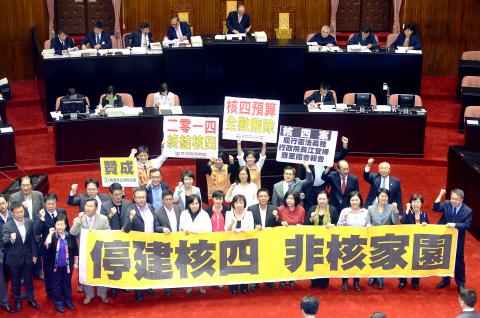Several Chinese Nationalist Party (KMT) legislators yesterday defied the party line on the issue of the Fourth Nuclear Power Plant during the legislative vote to change the discussion agenda.
The plant is located in New Taipei City’s Gongliao District (貢寮).
The ruling and opposition party caucuses yesterday locked horns over the addition of the nuclear issue to the agenda, after an attempt to do so was obstructed by the KMT at a meeting of the Procedure Committee on Tuesday.

Photo: Wang Yi-sung, Taipei Times
The Democratic Progressive Party (DPP) and the Taiwan Solidarity Union had asked for the agenda to include proposals in which Premier Jiang Yi-huah (江宜樺) would be required to deliver a special report to the legislature on the immediate termination of the construction and the slashing of the plant’s NT$8.1 billion (US$269 million) budget.
The KMT voted down the proposals, but not all of its members voted against.
KMT Legislator Lee Ching-hua (李慶華), whose constituency is in New Taipei City, defied instructions issued by his party and voted yes for proposals motioned by the opposition parties relating to the construction.
Also voting against the party were KMT legislators Lo Shu-lei (羅淑蕾), Ting Shou-chung (丁守中) and Lo Ming-tsai (羅明才), who voted for additions to next week’s agenda on Tuesday of the termination of the construction and the budget reductions.
The KMT caucus had demanded the presence of all its legislators for the ballot, and KMT deputy caucus whip Wang Ting-son (王廷升) had said that party discipline would be enforced, with fines imposed to punish those who failed to show up or voted against the party consensus.
After the vote, Lo told reporters that the KMT lawmakers “have no chance to express their own opinions.”
“You have to persuade us instead of forcing us to support [the party resolution], which is futile,” she added.
Lee said he believed that the party caucus was “well-aware of his stance [on the issue].”
Saying that he had once proposed holding a referendum on the termination of the plant’s construction — which he later retracted — Lee said it would have been lying to the public yesterday if he had not voted in the same way.
Meanwhile, the KMT also voted through a draft act to raise the requirements for recalling legislators.
The move has sparked controversy at a time when a campaign to recall various KMT legislators is ongoing.
The draft act, which requires that the petitioners provide photocopies of identity cards and affidavits — in addition to the existing requirements for name, address and identification number — was passed by the KMT majority last year and bypassed the standing committee’s deliberation for a direct second reading.
The opposition said, at the time, that the bill was a special clause for KMT Legislator Wu Yu-sheng (吳育昇), who was the target of a public recall campaign.
The KMT yesterday placed the bill on Tuesday’s agenda, which means it could pass a second reading with a floor vote.

CHAOS: Iranians took to the streets playing celebratory music after reports of Khamenei’s death on Saturday, while mourners also gathered in Tehran yesterday Iranian Supreme Leader Ayatollah Ali Khamenei was killed in a major attack on Iran launched by Israel and the US, throwing the future of the Islamic republic into doubt and raising the risk of regional instability. Iranian state television and the state-run IRNA news agency announced the 86-year-old’s death early yesterday. US President Donald Trump said it gave Iranians their “greatest chance” to “take back” their country. The announcements came after a joint US and Israeli aerial bombardment that targeted Iranian military and governmental sites. Trump said the “heavy and pinpoint bombing” would continue through the week or as long

TRUST: The KMT said it respected the US’ timing and considerations, and hoped it would continue to honor its commitments to helping Taiwan bolster its defenses and deterrence US President Donald Trump is delaying a multibillion-dollar arms sale to Taiwan to ensure his visit to Beijing is successful, a New York Times report said. The weapons sales package has stalled in the US Department of State, the report said, citing US officials it did not identify. The White House has told agencies not to push forward ahead of Trump’s meeting with Chinese President Xi Jinping (習近平), it said. The two last month held a phone call to discuss trade and geopolitical flashpoints ahead of the summit. Xi raised the Taiwan issue and urged the US to handle arms sales to

BIG SPENDERS: Foreign investors bought the most Taiwan equities since 2005, signaling confidence that an AI boom would continue to benefit chipmakers Taiwan Semiconductor Manufacturing Co’s (TSMC, 台積電) market capitalization swelled to US$2 trillion for the first time following a 4.25 percent rally in its American depositary receipts (ADR) overnight, putting the world’s biggest contract chipmaker sixth on the list of the world’s biggest companies by market capitalization, just behind Amazon.com Inc. The site CompaniesMarketcap.com ranked TSMC ahead of Saudi Aramco and Meta Platforms Inc. The Taiwanese company’s ADRs on Tuesday surged to US$385.75 on the New York Stock Exchange, as strong demand for artificial intelligence (AI) applications led to chip supply constraints and boost revenue growth to record-breaking levels. Each TSMC ADR represents

State-run CPC Corp, Taiwan (CPC, 台灣中油) yesterday said that it had confirmed on Saturday night with its liquefied natural gas (LNG) and crude oil suppliers that shipments are proceeding as scheduled and that domestic supplies remain unaffected. The CPC yesterday announced the gasoline and diesel prices will rise by NT$0.2 and NT$0.4 per liter, respectively, starting Monday, citing Middle East tensions and blizzards in the eastern United States. CPC also iterated it has been reducing the proportion of crude oil imports from the Middle East and diversifying its supply sources in the past few years in response to geopolitical risks, expanding